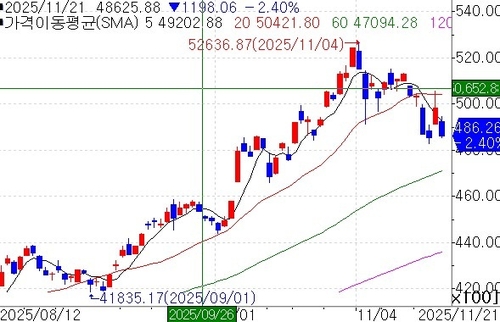
(Seoul=Yonhap Infomax) Min Jae Lee – On the 21st, Tokyo stocks declined, led by technology shares, despite the Japanese government's announcement of a large-scale economic stimulus package.
According to the Yonhap Infomax World Stock Index (6511), the Nikkei 225 closed at 48,625.88, down 1,198.06 points (2.40%) from the previous session.
The TOPIX index ended at 3,297.73, down 1.84 points (0.06%).
After breaking a losing streak with a sharp rally in the previous session, Japan’s major stock indices reversed course and fell within a day.
The Nikkei opened with a 1.15% gap down and quickly extended losses to over 2%. The TOPIX attempted intraday rebounds but repeatedly met resistance at higher levels.
Weakness in U.S. technology stocks overnight weighed on Japanese AI and semiconductor-related shares, dragging the indices lower. Only select large-cap domestic demand stocks showed resilience.
Shortly after the morning session, off-exchange block and basket trades reportedly totaled about 69 billion yen.
In the afternoon, index futures buying—believed to be from overseas short-term investors—helped the Nikkei pare some losses, but renewed selling pressure soon returned, resulting in volatile trading.
With Japan’s financial markets set to close on the 24th for Labor Thanksgiving Day, a mix of short-covering in futures and unwinding of hedging positions led to diverse trading flows.
The Japanese government announced the stimulus package would total 21.3 trillion yen (approximately 199.21 trillion won), the largest since the COVID-19 pandemic. To fund the measures, the government plans to secure a supplementary budget of 17.7 trillion yen.
Prime Minister Sanae Takaichi expressed confidence, stating, “We will foster a strong economy and boost growth rates, while reducing the government debt-to-GDP ratio and achieving fiscal sustainability to secure market trust.” However, her remarks failed to reverse the bearish sentiment in equities.
Economic indicators were mixed. According to S&P Global, Japan’s flash services Purchasing Managers’ Index (PMI) for November came in at 53.1, remaining in expansion territory. In contrast, the flash manufacturing PMI fell to 48.8, marking a fifth consecutive month of contraction.
Japan’s trade balance for October posted a deficit of 231.7 billion yen (about 2.17 trillion won), but the shortfall was smaller than the market consensus of a 280 billion yen deficit.
In the bond market, Japanese government bond (JGB) yields continued to fall (prices rose) despite the stimulus announcement.
According to Yonhap Infomax Overseas Rates (screen 6531), the 10-year JGB yield was 1.7859% at the close, down 3.45 basis points from the previous session.
The 30-year yield dropped 5.65 basis points to 3.3249%, while the 2-year yield slipped 1.15 basis points to 0.9501%.
Prime Minister Takaichi sought to reassure markets, noting that the total JGB issuance for this year, including the supplementary budget, would be lower than last year. “We will utilize increased tax revenues and, if necessary, cover shortfalls through bond issuance. The combined issuance after the initial and supplementary budgets is expected to be less than last year’s 42.1 trillion yen,” she said at a press conference.
Analysts noted that concerns over additional debt from the stimulus package were already priced in, and global equity weakness further boosted demand for safe-haven bonds.
Tomoki Shishido, chief rates strategist at Nomura Securities, said, “The size of the supplementary budget was already known, and with all factors priced in, bond buying prevailed.”
Meanwhile, credit default swap (CDS) premiums, which reflect the external creditworthiness and risk of sovereign bond issuers, surged, highlighting concerns over Japan’s fiscal health. According to Nikkei, the 5-year JGB CDS premium stood at 21.73 basis points as of the 20th, surpassing the previous high of 21.23 basis points recorded on October 13.
Takanori Sueizawa, analyst at SMBC Nikko Securities, commented, “Renewed caution over fiscal expansion, following coalition talks between the Liberal Democratic Party and Japan Innovation Party, and the increased likelihood of higher bond issuance are driving up CDS premiums.”
mjlee@yna.co.kr
(End)
Copyright (c) Yonhap Infomax. Unauthorized reproduction and redistribution, as well as AI learning and utilization, are prohibited.
Copyright © Yonhap Infomax Unauthorized reproduction and redistribution prohibited.

